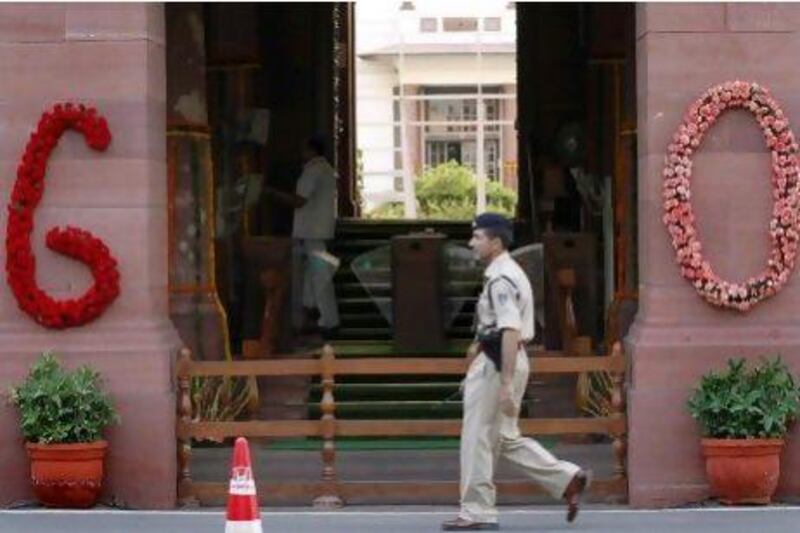NEW DELHI // India celebrated the 60th anniversary of its parliament yesterday on a subdued note, its image over the last year dented by chaos, interruptions and, as data show, an alarming dip in the amount of work it conducted.
Figures from PRS Legislative Research, an independent research institute based in New Delhi, reveal that, last year, parliament lost between 30 and 35 per cent of its working time to disruptions and protests by its members.
Television images of yelling and unruly parliamentarians, as well as regular newspaper headlines announcing premature adjournments of one or both houses of parliment have stirred growing disenchantment with the institution. On parliament's 60th birthday, the Indian prime minister, Manmohan Singh, acknowledged its tarnished reputation and called for "substantive and sincere" introspection.
In his address to a special sitting of parliament yesterday, Mr Singh noted that the "daily routine of disruptions, adjournments and shouting in the House is leading many outside to question the efficacy of the institution".
Mr Singh's remarks came only two days after parliament was in uproar over a seemingly trivial issue: a cartoon that was first published in 1949 that had been reprinted in an 11th-grade textbook, titled The Indian Constitution at Work, since 2006.
The cartoon, by the satirist K Shankar Pillai, depicts Jawaharlal Nehru, the first prime minister of an independent India, standing with a whip behind BR Ambedkar, the architect of India's constitution; Mr Ambedkar, also holding a whip, sits on a snail labelled "Constitution", trying to get it to move faster.
In the textbook, a caption explained that the cartoon lampooned "'the snail's pace' with which the Constitution was made".
Last Friday, members of the Lok Sabha, India's lower house of parliament, disrupted proceedings by brandishing copies of the textbook and claiming that the cartoon insulted Mr Ambedkar, who was a prominent leader of the Dalit community.
The minister in charge of education, Kapil Sibal, apologised and promised that there "won't be any further distribution of books with the cartoon". This did not stop members of the Republican Party of India from vandalising the Pune office of a professor who had been involved in drafting the textbook.
That professor, Suhas Palshikar, as well as a colleague, Yogendra Yadav, resigned from the National Council for Educational Research and Training, which had published the textbook in question.
In their resignation letter, which was released to the media, the professors protested that the "short, heated and not very well informed debate in the Parliament did not do justice to the responsibility that a democratic society has towards it future generations".
India's Lok Sabha met for the first time on May 13, 1952, following general elections that had been held in January of that year. The 499 elected members of the Lok Sabha were sworn in on that day.
That first Lok Sabha, according to numbers from the statistical handbook of the ministry of parliamentary affairs, worked an average of nearly 150 days each year for its five-year term. In contrast, PRS Legislative Research found, that number had plummeted to 73 days in 2011.
Even in this truncated period, significant chunks of time can be lost. The parliament's statistical handbook recorded, for instance, that 93.24 per cent of allotted Lok Sabha time was lost due to adjournments in the winter session of 2010. The handbook chalked these disruptions up to the uproar over "the issue of various corruptions".
The present Lok Sabha, which was elected in 2009, "has been the most disrupted since 1985," which is as far back as PRS Legislative Research's data on disruptions go, said Devika Malik, a PRS researcher.
These disruptions come at taxpayer expense, because India's budget allocates 25 million rupees (Dh1.7m) as expenditure for each day that parliament is supposed to function.
ssubramanian@thenational.ae
Follow
The National
on
[ @TheNationalUAE ]
& Samanth Subramanian on
[ @Samanth_S ]





